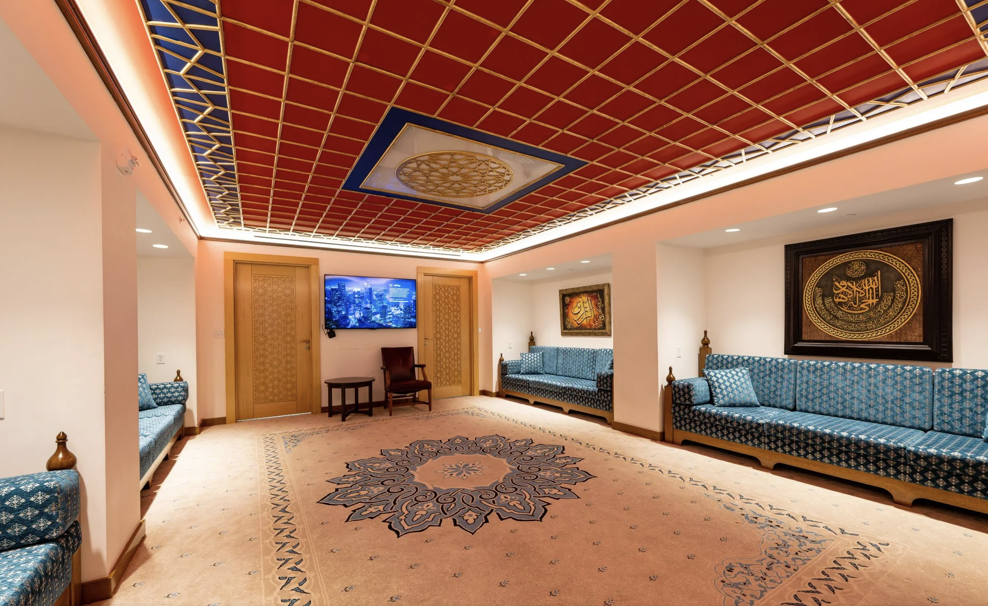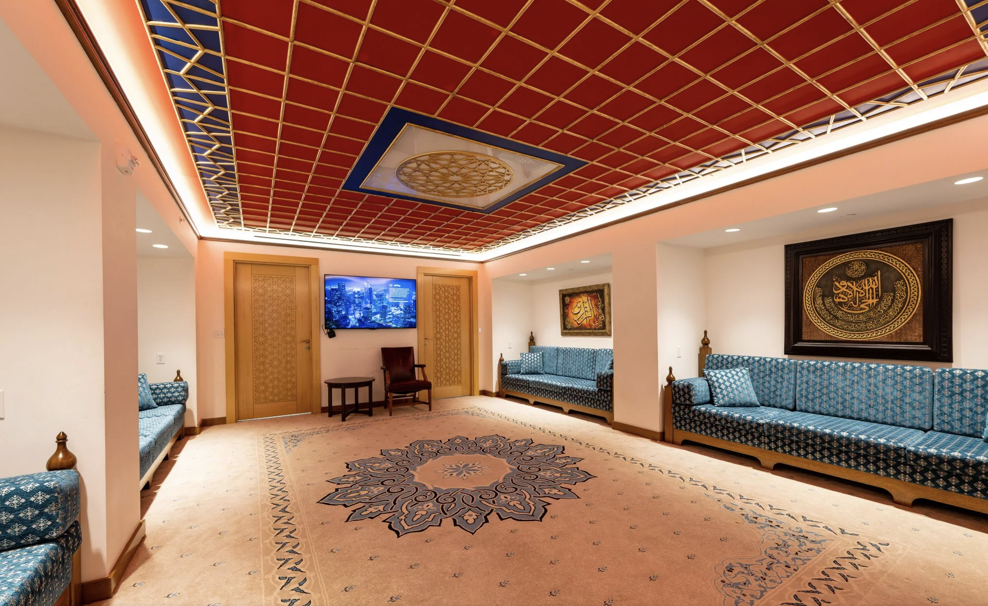Georgetown University has officially opened the Yarrow Mamout Masjid — the first mosque on a U.S. university campus with a spirituality and formation hall, halal kitchen and ablution stations.
Located in the Village C West dormitory, the masjid first opened unfinished in fall 2019 as a space for Muslim students to pray and reflect before construction on the mosque finished earlier this year. The masjid is named for Yarrow Mamout, a former slave who practiced Islam throughout his life and settled in the Georgetown neighborhood after buying his freedom in 1796.
Students, local Muslim leaders, professors and diplomats from Turkey, Qatar and Indonesia attended the March 18 opening ceremony, which came seven years after planning began.
“The construction of the Yarrow Mamout Masjid has been a long-awaited moment for the entire Muslim community at Georgetown, as it provides a visible and tangible expression of the community’s presence and contributions on campus,” Aleena Dawer (SOH ’24), the director of spirituality and service of Georgetown’s Muslim Students Association (MSA), wrote to The Hoya.
“The mosque represents a space for Muslim students, faculty, and staff to come together in prayer, community, and celebration, and it serves as a powerful reminder of the strength and resilience of the Muslim community in the face of challenges and adversity,” Dawer added.

Dawer said the mosque provides her with a place to meet and build friendships with other Muslims from varying backgrounds and to find belonging, support and peace on campus.
“As a Muslim, the Yarrow Mamout Masjid is a sanctuary for me, a place where I can find solace and peace amidst the chaos of the world. It’s a place where I can connect with my faith, reflect on my life, and seek guidance,” Dawer wrote. “It’s a place that inspires me to be a better person, to strive for excellence in all aspects of my life, and to live according to the principles of Islam which include justice, respect, and peace.”
Nile Adhami (CAS ’25), the MSA’s director of programming and its incoming president, said the masjid is a safe space for him to practice his faith, relax and study.
“The new Yarrow Mamout Masjid means everything to me — as a Muslim, it can be difficult to find a home on campus,” Adhami wrote to The Hoya. “It’s a place where I can feel comfortable to be myself, and engage my Islamic faith to the fullest. In a Catholic Jesuit University, that’s a big deal.”
Adhami said the MSA plans to host several community building events, including talks with visiting scholars and Imams, in the newly completed masjid, especially in light of growing global hostility against the Islamic faith.
“The Masjid is an incredible space for hosting community building events, religious talks, and spiritual programming,” Adhami wrote. “In a world where Muslims so often are marginalized, scape-goated, and oppressed, the Yarrow Mamout Masjid is a place where we can proudly assert our presence as Muslims in America.”
Ammar Hussain (SFS ’24), the MSA’s vice president, echoed Adhami’s sentiments on the community-building potential of the mosque.
“When we built this Masjid at Georgetown, we didn’t just build walls and doors. We built a community — a community in which Muslims from all backgrounds can come together to practice our religion, grow in our faith and spirituality, and form familial connections with other Muslims on campus. A building doesn’t determine community, but what it does do is provide Muslims like me a space on campus where we can freely be ourselves,” Hussain wrote to The Hoya.
Islamophobia, prejudice against Muslims and the religion of Islam, has been on the rise. Over 60% of Muslims in America report being the target of religious discrimination. Anti-Muslim hatred has also become an increasingly global phenomenon in recent years.
Dawer said she hopes non-Muslim students will be able to use the new masjid as an opportunity to engage in interfaith dialogue and learn more about Islam and its customs.
“To me, interfaith dialogue is about more than just learning about different religions or beliefs — it’s about cultivating a deep sense of empathy and compassion for others, and recognizing the fundamental interconnectedness of all human beings,” Dawer wrote.
“By engaging in interfaith dialogue, we can break down stereotypes and misconceptions and build bridges of understanding,” Dawer added.





















